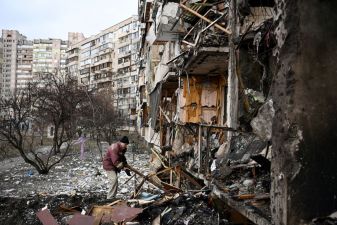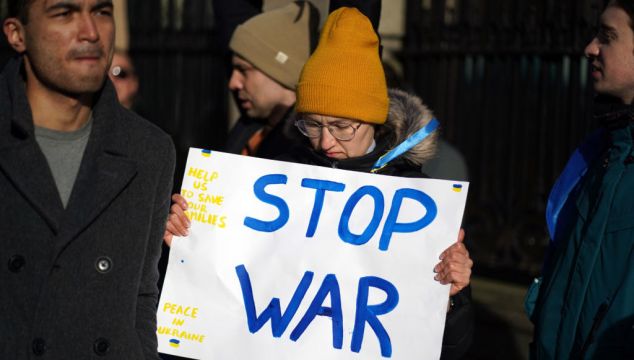The repercussions of the conflict in Ukraine will be seen in Ireland at an economic level, the Minister of State for European Affairs has said.
“The price of fuel has been affected by the uncertainty in this region for a considerable period of time. There is certainly going to be an economic impact,” Thomas Byrne said.
“There is no question of that. That is why we want peace because it is the foundation for economic success and economic progress. We are pursuing peace at every level.”
Mr Byrne was speaking after European Union leaders agreed sanctions against Russia following an emergency summit in Brussels late yesterday. He played down disagreements and insisted there is unity over the latest package of sanctions.
Asked on RTÉ radio about the Ukrainian president’s claim that the country is being left to fight alone, Mr Byrne said the EU is not a military organisation.
“The European Union is not involved in military action in relation to Ukraine,” he said. “That’s just not simply something that could ever be envisaged.
“But the sanctions that have been put in place - and Ireland has been pushing for the widest possible sanctions - the sanctions that have been put in place are extremely broad.”
Question of refugees
Mr Byrne said that Ireland plans to do everything in its power to provide humanitarian support to impacted persons in the Ukraine.
"They will need our help. They are in a very difficult situation. Very brave. But the Russian army, it's just so much bigger, and they are going to need a lot of help and we are going to give that to them. There is also going to be the question of refugees of course if this war continues."
He said Ireland pushed for the "broadest possible sanctions" against Russia, with the Irish Government having "no difficulty" with the Swift payments system being withdrawn from the country.
Swift (the Society for Worldwide Interbank Financial Telecommunication) is the main secure messaging system that banks use to make rapid and secure cross-border payments, allowing international trade to flow smoothly.
The United States and EU have opted not to cut Russia off from the system as part of their sanctions, but could revisit that issue, US President Joe Biden said on Thursday.
Some states are reluctant to make such a move because, while it would hit Russian banks hard, it would make it tough for European creditors to get their money back and Russia has in any case been building up an alternative payment system.
“Our priority as an Irish Government was to have unity around the table. That was very, very important," Mr Byrne said.
“Having said that, we pushed and will continue to push for the broadest possible sanctions. So yes, the Irish Government has no difficulty whatsoever with the Swift system being sanctioned, and that’s something that we would support.
"I think last night it was clear that there wasn't unanimity on that. That may well come at another point but that is something we would support."
Ireland stands in solidarity with the Ukrainian people in their darkest hour.
We will support the imposition of comprehensive and severe sanctions on Russia.#Ukraine #EUCO pic.twitter.com/mBudOgqG99— Micheál Martin (@MichealMartinTD) February 24, 2022
Appearing on the same programme, British Ambassador to Ireland Paul Johnston said the EU had made a “good start” on sanctions.

He added that the UK “would hope very soon that there’ll be a consensus” on Swift.
Mr Johnston pledged sanctions announced by the UK government to target Russian money in London will be a “full frontal assault on Russian companies and Russian individuals”.
He added: “The details of the legislation are being worked out at speed.”







